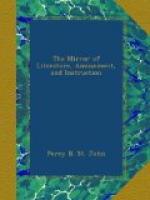In 1294, Edward I., in order to raise funds for the invasion of Scotland, addressed writs to the sheriffs, directing them to send “representatives for every city and borough in their bailiwicks.” Many of the boroughs at this time, on account of the expense of paying their representatives, declined to send members; but the King took care for his own purposes that the Royal and other boroughs where his influence extended, should send members: hence in Cornwall and the other counties on the same coast, where the King’s power and property chiefly lay, on account of the mines and tallages, almost every village sent representatives.
In 1414, the fifth year of the reign of Henry IV., the Commons proceeded in their design of regulating the King’s household, with whom the Lords accorded; and they required that four persons should be removed out of the King’s house,—namely, the Abbot of Dore, the King’s confessor, with Durham and Crosbie, gentlemen of his chamber. On February 9, 1414, the confessor, Durham and Crosbie, came into the parliament before the King and the Lords, when his Majesty took occasion to excuse those officers himself, saying, that he knew no cause why they should be removed, but only because they were hated by the people: yet he charged them to depart from his house, according to the desire of his Commons, and would have proceeded in the same manner against the Abbot of Dore, had he been present. The printed roll of Parliamentary proceedings adds these remarkable expressions:—“And our Lord the King moreover said that he would see that the Same measures were taken with regard to any one about his Royal person, who might incur the hatred or indignation of his people.” A proceeding similar to this took place in 1451, when Henry VI., at the request of the House of Commons, removed from his court and presence several individuals of either sex, against whom there was universal noise and clamour.
On November 27, 1621, the House of Lords sentenced John Blount to pillory, imprisonment, and labour for life, for counterfeiting a Lord’s protection. This was the first case of imprisonment beyond the session, by the House of Lords. The first precedent for their infliction of fines appears about two years afterwards, when they sentenced one Morley to pay 1,000_l._, and condemned him to the pillory for a libel on the Lord Keeper.
The number of Bishops having seats in the House of Lords is thirty; namely, the two English archbishops, twenty-four English bishops, and four Irish bishops; and they all sit in the house, not as churchmen, or peers representing the clergy, in their various grades, (for these are all represented with the commonalty in the lower House,) but as soldiers, that is, as barons holding certain land by military tenure—tenants in capite per baroniam; and therefore compelled, under the feudal system, by which they were created, to furnish their quota of knights, or men-at-arms, and do other military service to the crown.




